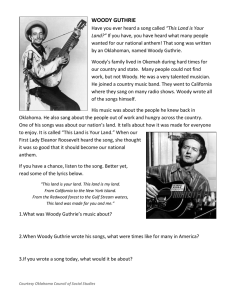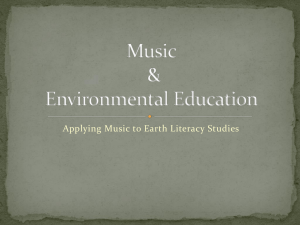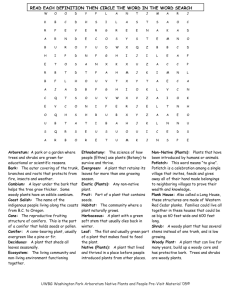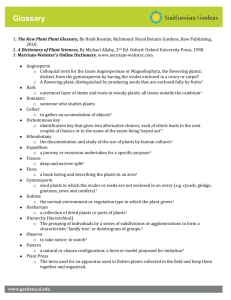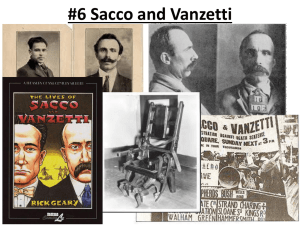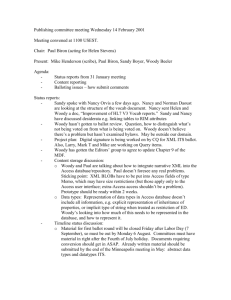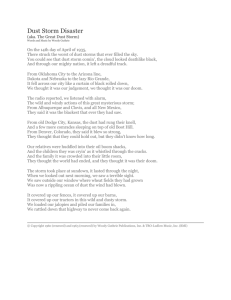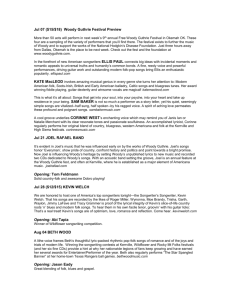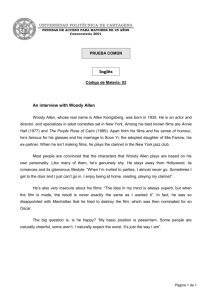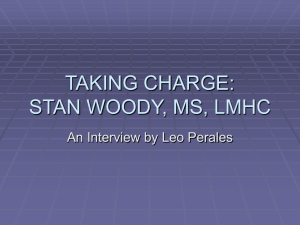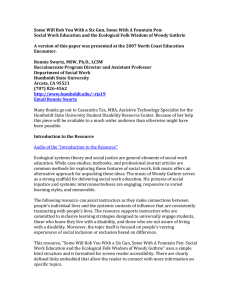Woody Guthrie
advertisement
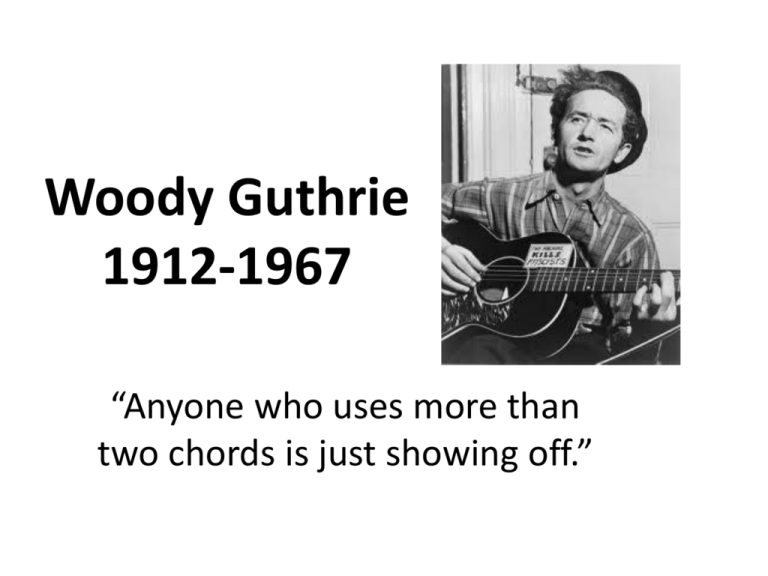
Woody Guthrie 1912-1967 “Anyone who uses more than two chords is just showing off.” Why Woody Matters • He lived through The Great Depression, The Great Dust Storm, WWII, and the political turmoil caused by Unionism, the Communism Party and The Cold War. • He wrote almost 3,000 song lyrics, published two novels and authored poems, prose and plays. Many of his songs were protest songs. • Today, he makes history seem palpable through his native ballads written in strophic form. • Posthumously inducted into multiple hall of fames. Early Years: Requisites of a Folk Artist • Born in Okemah, Oklahoma, a small town in economic downturn, on July 14, 1912. • Sister died in a fire, mother died in an insane asylum, father committed suicide by fire. • Spent rest of childhood in an orphanage until 1929 at age 17 when he hit the road. • He loved being a traveling, broke hobo who mostly played gigs in saloons Music Playing Technique • Learned how to play harmonica from a “colored boy who shined shoes” in his hometown. • Eventually mastered the “Carter Family lick” guitar technique: – Involved rhythmic action in both hands – Hammered-on, pulled-off and slid while playing melody at the same time. Gaining Notoriety • Had first radio show on KFVD in Los Angeles, California from 1937-1940. • In that time was able to write songs that connected to people that had been disenfranchised by hardship. Juxtaposed John Steinbeck’s Grapes of Wrath. • “I Ain’t Got No Home,” “Going Down the Road Feelin’ Bad,” “Talking Dust Bowl Blues,” and “Do Re Mi” are just a few of his popular songs with which people could empathize. • When he moved to New York in 1940 he joined the Almanac Singers who soon became very well-known amongst the public. “Do Re Mi” • Do Re Mi - Woody Guthrie - YouTube Influences on Labor Unions • Was a strong advocate for labor unions. • Raised awareness of the hardships of migrant workers through song. • “Do Re Mi” is about work-seeking migrants being blockaded from entering California. Recorded 1940 on Dust Bowl Ballads • “Deportee(Plane Wreck at Los Gatos)” (1948) 32 migrant workers died with no recognition. • “Union Burying Ground” and “Better World A’Comin” are both about the union movements. World War II • Woody served in the Merchant Marine and the Army. • Composed hundreds of anti-Hitler, pro-war and ballads to rally the troops.(“Talking Merchant Marine,” “The Sinking of the Rueben James.”) • The Army enlisted him to write songs about the dangers of sexually transmitted diseases.(“Venereal Disease Blues,” “Venereal Disease Waltz.”) Influences on the Communist Party and The Cold War • In the late 1940’s Woody was blacklisted for his activist stance on unions, free speech and equal rights. • He had to move to Florida, where a friend housed other ousted, activist artists. • Wrote a lot of anti-fascist songs at that time.(“Tear this Fascist Down,” “All You Fascists Bound to Lose.”) • Eventually road-tripped back to New York. • Woody Guthrie~ All You Fascists Bound To Lose - YouTube Death and Continued Legacy • His health began to deteriorate around 1960. • He was wrongfully diagnosed multiple times until finally the conclusion was made that he had Huntington’s Disease. • While he was in the hospital, a young Bob Dylan paid him a visit to play him a song on Dylan’s guitar. • Died October 3, 1967 at Creedmoor State Hospital in Queens, New York. • After Woody’s death, his son Arlo Guthrie released “Alice’s Restaurant” which became the “iconic anti-war anthem of the next generation.” Works Cited(MLA): • Canoni, Anna. "Woody Guthrie's Biography." Woody Guthrie. Woody Guthrie Publications, Inc., 2010-2013. Web. 4 Aug 2013. • Guthrie, Woody, perf. Dir. Alan Lomax. Library of Congress Recordings. United States Library of Congress: Washington D.C., Mar 1940. Radio. • "Woody Guthrie > Quotes." Good Reads. Goodreads Inc., 2013. Web. 5 Aug 2013.
